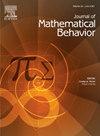Snapshots of sameness: Characterizations of mathematical sameness across student groups
IF 1.7
Q3 EDUCATION & EDUCATIONAL RESEARCH
引用次数: 0
Abstract
Sameness is foundational to mathematics but has only recently become an area of focus in mathematics education research. In this paper, we describe characterizations of sameness generated by four student groups: discrete mathematics students, linear algebra students, abstract algebra students, and graduate students. Based on qualitative analysis of open response surveys, we compare these groups’ characterizations of sameness; note the subcomponents discussed and variation within each dimension; and highlight experiences influential to students’ perceptions of sameness. Findings include interpretability of sameness as a big idea, nascent development of thematic connections across courses, emphases on current course material rather than connections to prior courses for students solicited from a particular course, greater reflectiveness from the graduate student group, and abstract algebra as an impactful course. Implications include a need for thoughtful examinations of how “big ideas” develop among students and what experiences might support such development.
同一性的剪影:不同学生群体的数学同一性特征
同一性是数学的基础,但直到最近才成为数学教育研究的重点领域。在本文中,我们描述了四个学生群体对同一性的描述:离散数学学生、线性代数学生、抽象代数学生和研究生。基于对开放式回答调查的定性分析,我们比较了这些群体对同一性的描述;指出了每个维度中讨论的子部分和差异;并强调了对学生同一性认知有影响的经历。调查结果包括:同一性作为一个大概念的可解释性、跨课程主题联系的初步发展、强调当前课程材料而不是从特定课程中征集的学生与以前课程的联系、研究生群体的反思能力更强以及抽象代数是一门有影响力的课程。研究的启示包括:需要对学生如何形成 "大思想 "以及哪些经验可以支持这种发展进行深思熟虑的研究。
本文章由计算机程序翻译,如有差异,请以英文原文为准。
求助全文
约1分钟内获得全文
求助全文
来源期刊

Journal of Mathematical Behavior
EDUCATION & EDUCATIONAL RESEARCH-
CiteScore
2.70
自引率
17.60%
发文量
69
期刊介绍:
The Journal of Mathematical Behavior solicits original research on the learning and teaching of mathematics. We are interested especially in basic research, research that aims to clarify, in detail and depth, how mathematical ideas develop in learners. Over three decades, our experience confirms a founding premise of this journal: that mathematical thinking, hence mathematics learning as a social enterprise, is special. It is special because mathematics is special, both logically and psychologically. Logically, through the way that mathematical ideas and methods have been built, refined and organized for centuries across a range of cultures; and psychologically, through the variety of ways people today, in many walks of life, make sense of mathematics, develop it, make it their own.
 求助内容:
求助内容: 应助结果提醒方式:
应助结果提醒方式:


